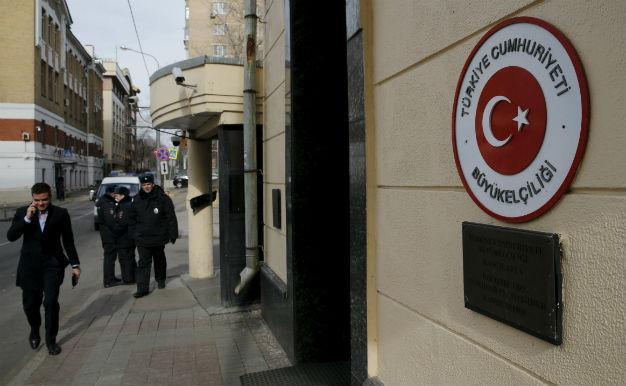Turkish firms in Russia struggle as diplomatic row rages
MOSCOW - Reuters

REUTERS photo
Four months after Russian President Vladimir Putin accused Ankara of a “stab in the back,” Turkish business executives in Russia are getting used to saying hasty goodbyes.“Every week another friend calls to say he’s leaving,” one Turkish businessman based in Moscow told Reuters.
“It’s become very difficult for Turks to do business here.”
The row erupted in November when Turkish military jets shot down a Russian warplane near the Syrian border, and is still weighing on what had been a close economic relationship.
Putin has imposed sanctions on Turkey and trade between the two countries - which back opposing sides in the five-year Syrian conflict - has dived due to the combined effects of the measures and the collapse in global oil prices.
In interviews with Reuters, expatriate members of the Turkish business community accused Russian authorities of creating obstacles for their firms that go beyond the measures set out in the official sanctions.
This, along with economic crisis in Russia, was why increasing numbers of Turks are heading back home, they said.
Before the plane was brought down, about 1,500 Turkish firms operated in Russia in businesses ranging from construction and tourism to imports of Turkish fruit, vegetables and textiles.
While no numbers are available, one of the expatriates estimated that around 200 Turkish firms have since left.
Many Turkish executives say they have experienced difficulties in getting Russian visas, and some have had to rearrange their affairs.
Of the four businessmen interviewed in Moscow, two said they had registered their companies in the names of Russian relatives or trusted Russian friends to try to avoid additional checks from law enforcement officers.
All said it was difficult to stay as their country was demonized in Russian media. The Komsomolskaya Pravda mass-market tabloid ran a report earlier this month headlined “Turkey never was and never will be a friend of Russia”.
The businessmen requested that their names and those of their firms not be published, citing fears that public comments could result in further pressure from Russian officials.
Russia’s Interior Ministry did not respond to a Reuters request for comment. The Economy Ministry said the problems outlined by Turkish businessmen did not fall within its remit.
First shock wave
Ikbal Durre, a Moscow-based commentator on Russian-Turkish affairs, expressed hope that the row would eventually blow over. “The situation is moving towards stabilization, just not particularly quickly. The first shockwave has passed,” he said.
But the cost has been high. Turkish exports to Russia fell to around $108 million in January, according to the Turkish statistics service, down two-thirds on the previous year. Russian exports to Turkey, mainly of energy, were 30 percent lower at $1.3 billion, reflecting weak oil prices.
The sanctions include a ban on Russian firms importing a range of Turkish foodstuffs as well as canceling a visa-free regime and restricting Turkish firms from working in certain Russian business sectors including tourism.
Turkish firms had stood to gain from an earlier set of Russian sanctions - restrictions on Western food imports imposed in retaliation for U.S. and European Union sanctions over the Ukraine crisis.
Now Turkish businessmen say that over-zealous Russian officials are subjecting their goods to additional checks at customs and have conducted impromptu searches at their premises.
Dagir Khasavov, managing partner of Moscow-based legal firm Drakonta which has Turkish clients, described the attitude of Russian law enforcement agencies towards Turkish citizens since the downing of the plane as “hostile.”
One Turkish businessman said he had registered his firm, which serves Russia’s metals industry, in the name of a Russian friend to try to avoid problems.
“I used to own 100 percent of my firm. Now I feel like a thief of my own goods,” he said.
The first businessman cited in this article said shipments of Turkish textiles were sometimes held up for as much as 20 days at the Russian border, longer than previously.
A Turkish diplomatic source said it was too early to say the two sides had found a way to resolve the dispute.
“We hope that a compromise can be found, but we haven’t seen any big shifts so far,” the source said.
Around 80,000 Turkish citizens live in Russia, although not all are involved in business.
















